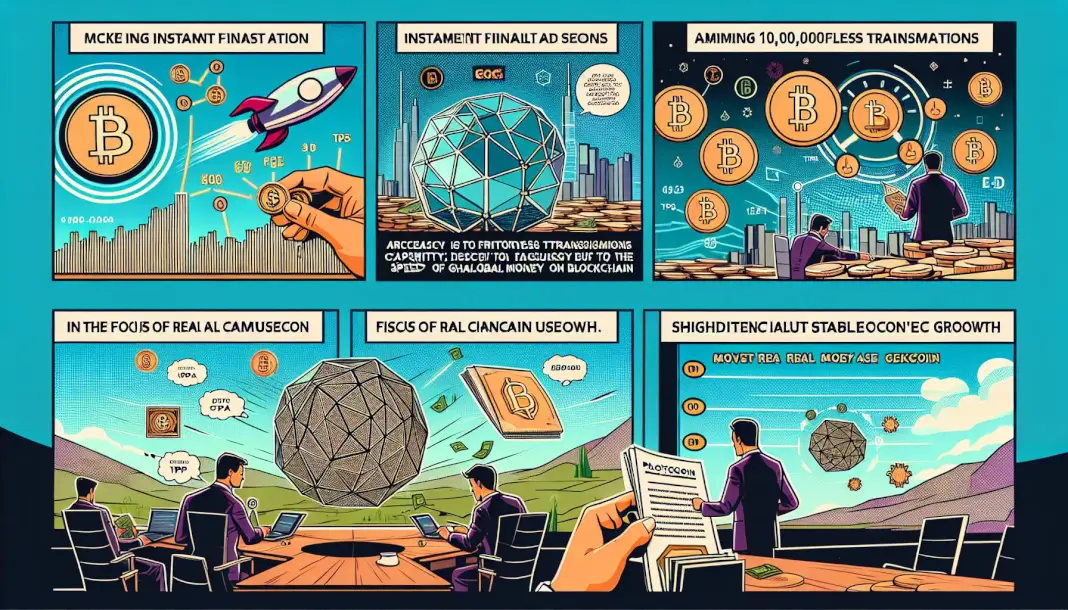KEY TAKEAWAYS
- Polygon aims to achieve 100,000 transactions per second with its gigagas roadmap, enhancing global financial transaction speed on the blockchain.
- The network’s strategy focuses on instant finality and frictionless transactions to drive institutional adoption for payments and real-world assets.
- Polygon’s upcoming upgrades will increase its capacity to 1,000 TPS, supporting a future of blockchain-based everyday transactions and AI-driven economies.
- Major financial institutions like BlackRock and JPMorgan are leveraging Polygon for tokenized assets, highlighting its role in high-value financial products.
Polygon is setting ambitious goals with its gigagas roadmap, aiming to achieve 100,000 transactions per second (TPS) to enhance the speed of global financial transactions on the blockchain. This initiative is powered by the POL token.
The network’s strategy focuses on providing instant finality and frictionless transactions, which are expected to drive institutional adoption for payments and real-world assets (RWAs). Polygon’s vision is to become the universal layer for global payments and RWA transactions, eliminating intermediaries to enhance efficiency.
The first milestone in this roadmap is scheduled for early July, with an upgrade that will increase Polygon’s capacity to 1,000 TPS and reduce finality to five seconds. This upgrade is part of a broader plan to align the technology and ecosystem with a future where blockchain supports everyday transactions, an AI-driven economy, and the management of trillions in assets.
Polygon is focusing on real use cases, such as moving real money and assets onchain. The network has seen significant growth in stablecoin usage, with a supply reaching $2.5 billion, supported by integrations with major stablecoin providers like Circle and Tether. Polymarket, a platform built on Polygon, has processed over $14 billion in USDC volume, highlighting the network’s capacity for high-volume transactions.
In April 2025, Polygon led in peer-to-peer transactions with $3.7 billion in volume, marking an 85% increase over the previous six months. Institutional players and fintech startups, including Stripe and Nexo, have built traditional finance infrastructure on Polygon’s blockchain, contributing to its status as a leading chain for USDC transactions with 2.3 million active wallets.
Polygon is also becoming a key platform for tokenizing assets, ranging from equities to collectibles. In Q1 2025, it ranked fifth among blockchains by RWA value, with over $271 million in assets onchain. Major financial institutions like BlackRock and JPMorgan have deployed tokenized assets on Polygon, leveraging its stable network for high-value financial products.
The network’s roadmap includes the Bhilai Upgrade, which will transform Polygon into a 1,000+ TPS chain with low-cost gas fees and rapid finality. This upgrade is expected to enhance Polygon’s capacity for payments and asset tokenization.
Looking ahead, Polygon plans to connect to Agglayer, an interoperable multichain settlement layer, to further increase capacity and interoperability. The long-term vision is for Polygon to become the anchor of a seamless global payments network, supporting a wide range of applications from retail payment networks to AI-driven micropayments.
Polygon’s strategic roadmap aims to address current challenges while paving the way for a borderless economy powered by blockchain technology. The network’s evolution is set to make digital payments fast, cheap, and reliable, ultimately supporting millions of users worldwide.
Why This Matters: Impact, Industry Trends & Expert Insights
Polygon’s ambitious gigagas roadmap aims to achieve 100,000 transactions per second, enhancing the speed and efficiency of global financial transactions on the blockchain.
Recent industry reports indicate that faster blockchain transaction speeds are driving broader adoption of blockchain technology across industries. This aligns with Polygon’s strategy to enhance its network’s capacity and efficiency, making it a viable alternative to traditional payment systems.
As per insights from Coin Bureau, Polygon is recognized as a significant player in blockchain scalability, focusing on institutional adoption and providing efficient Ethereum scaling solutions. This supports Polygon’s initiative to drive institutional adoption and enhance its network’s performance in handling real-world asset transactions.
Explore More News:
Disclaimer: The views expressed in this article are those of the authors and do not necessarily reflect the official policy of CoinsHolder. Content, including that generated with the help of AI, is for informational purposes only and is not intended as legal, financial, or professional advice. Readers should do their research before taking any actions related to the company and carry full responsibility for their decisions.

